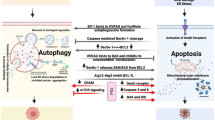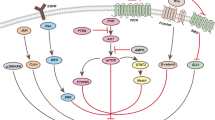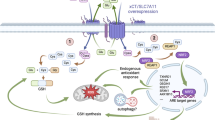Abstract
Survivin is a member of the inhibitors of apoptosis protein (IAP) family and is highly expressed in various cancer cells. However, the molecular mechanisms regulating survivin expression remain unclear. In this study, we investigated the role of mitogen-activated protein kinases (MAPKs) in regulating survivin in the human lung adenocarcinoma cell line H1355 in response to arsenic trioxide (As(3+)). Our data indicated that As(3+) induced cytotoxicity accompanied by down-regulation of survivin, cleavage of Poly ADP-ribosyl polymerase (PARP) and activations of MAPKs, including ERK1/2, p38 and c-jun N-terminal kinase (JNK). We found that blockage of p38 or JNK activation attenuated the As(3+)-induced survivin down-regulation and PARP cleavage with significant reversal of cell viability, however, by only 5–8%. On the other hand, the MEK inhibitor PD098059 or the ubiquitin-proteasome inhibitor MG-132 exhibited little effect on survivin down-regulation and PARP cleavage induced by As(3+). In this study, we demonstrated that As(3+) could down-regulate survivin via activations of p38 and JNK in an ubiquitin-proteasome independent pathway and lead to cytotoxicity and apoptosis in the human lung adenocarcinoma cell line H1355.






Similar content being viewed by others
References
Akao Y, Nakagawa Y, Akiyama K (1999) Arsenic trioxide induces apoptosis in neuroblastoma cell lines through the activation of caspase 3 in vitro. FEBS Lett 455:59–62
Alberg AJ, Samet JM (2003) Epidemiology of lung cancer. Chest 123:21S–49S
Ambrosini G, Adida C, Altieri DC (1997) A novel anti-apoptosis gene, survivin, expressed in cancer and lymphoma. Nat Med 3:917–921
Bargonetti J, Chicas A, White D, Prives C (1997) p53 represses Sp1 DNA binding and HIV-LTR directed transcription. Cell Mol Biol (Noisy-le-grand) 43:935–949
Borellini F, Glazer RI (1993) Induction of Sp1-p53 DNA-binding heterocomplexes during granulocyte/macrophage colony-stimulating factor-dependent proliferation in human erythroleukemia cell line TF-1. J Biol Chem 268:7923–7928
Carter BZ, Milella M, Altieri DC, Andreeff M (2001) Cytokine-regulated expression of survivin in myeloid leukemia. Blood 97:2784–2790
Chao JI, Kuo PC, Hsu TS (2004) Down-regulation of survivin in nitric oxide-induced cell growth inhibition and apoptosis of the human lung carcinoma cells. J Biol Chem 279:20267–20276
Chen YC, Lin-Shiau SY, Lin JK (1998) Involvement of reactive oxygen species and caspase 3 activation in arsenite-induced apoptosis. J Cell Physiol 177:324–333
Chen GQ, Shi XG, Tang W, Xiong SM, Zhu J, Cai X, Han ZG, Ni JH, Shi GY, Jia PM, Liu MM, He KL, Niu C, Ma J, Zhang P, Zhang TD, Paul P, Naoe T, Kitamura K, Miller W, Waxman S, Wang ZY, de The H, Chen SJ, Chen Z (1997) Use of arsenic trioxide (As2O3) in the treatment of acute promyelocytic leukemia (APL): I. As2O3 exerts dose-dependent dual effects on APL cells. Blood 89:3345–3353
Dai J, Weinberg RS, Waxman S, Jing Y (1999) Malignant cells can be sensitized to undergo growth inhibition and apoptosis by arsenic trioxide through modulation of the glutathione redox system. Blood 93:268–277
De Schepper S, Bruwiere H, Verhulst T, Steller U, Andries L, Wouters W, Janicot M, Arts J, Van Heusden J (2003) Inhibition of histone deacetylases by chlamydocin induces apoptosis and proteasome-mediated degradation of survivin. J Pharmacol Exp Ther 304:881–888
Gurr JR, Yih LH, Samikkannu T, Bau DT, Lin SY, Jan KY (2003) Nitric oxide production by arsenite. Mutat Res 533:173–182
Hoffman WH, Biade S, Zilfou JT, Chen J, Murphy M (2002) Transcriptional repression of the anti-apoptotic survivin gene by wild type p53. J Biol Chem 277:3247–3257
Huang C, Ma WY, Li J, Dong Z (1999a) Arsenic induces apoptosis through a c-Jun NH2-terminal kinase-dependent, p53-independent pathway. Cancer Res 59:3053–3058
Huang C, Ma WY, Li J, Goranson A, Dong Z (1999b) Requirement of Erk, but not JNK, for arsenite-induced cell transformation. J Biol Chem 274:14595–14601
Iwama K, Nakajo S, Aiuchi T, Nakaya K (2001) Apoptosis induced by arsenic trioxide in leukemia U937 cells is dependent on activation of p38, inactivation of ERK and the Ca2+-dependent production of superoxide. Int J Cancer 92:518–526
Joazeiro CA, Weissman AM (2000) RING finger proteins: mediators of ubiquitin ligase activity. Cell 102:549–552
Kajiguchi T, Yamamoto K, Hossain K, Akhand AA, Nakashima I, Naoe T, Saito H, Emi N (2003) Sustained activation of c-jun-terminal kinase (JNK) is closely related to arsenic trioxide-induced apoptosis in an acute myeloid leukemia (M2)-derived cell line, NKM-1. Leukemia 17:2189–2195
Kang SH, Song JH, Kang HK, Kang JH, Kim SJ, Kang HW, Lee YK, Park DB (2003) Arsenic trioxide-induced apoptosis is independent of stress-responsive signaling pathways but sensitive to inhibition of inducible nitric oxide synthase in HepG2 cells. Exp Mol Med 35:83–90
Kawasaki H, Altieri DC, Lu CD, Toyoda M, Tenjo T, Tanigawa N (1998) Inhibition of apoptosis by survivin predicts shorter survival rates in colorectal cancer. Cancer Res 58:5071–5074
Kitamura K, Minami Y, Yamamoto K, Akao Y, Kiyoi H, Saito H, Naoe T (2000) Involvement of CD95-independent caspase 8 activation in arsenic trioxide-induced apoptosis. Leukemia 14:1743–1750
LaCasse EC, Baird S, Korneluk RG, MacKenzie AE (1998) The inhibitors of apoptosis (IAPs) and their emerging role in cancer. Oncogene 17:3247–3259
Li F, Ambrosini G, Chu EY, Plescia J, Tognin S, Marchisio PC, Altieri DC (1998) Control of apoptosis and mitotic spindle checkpoint by survivin. Nature 396:580–584
Li F, Ling X, Huang H, Brattain L, Apontes P, Wu J, Binderup L, Brattain MG (2005) Differential regulation of survivin expression and apoptosis by vitamin D(3) compounds in two isogenic MCF-7 breast cancer cell sublines. Oncogene 24:1389–1395
Lin P, Wang HJ, Lee H, Lee HS, Wang SL, Hsueh YM, Tsai KJ, Chen CY (1999) NAD(P)H: quinone oxidoreductase polymorphism and lung cancer in Taiwan. J Toxicol Environ Health A 58:187–197
Ling YH, Jiang JD, Holland JF, Perez-Soler R (2002) Arsenic trioxide produces polymerization of microtubules and mitotic arrest before apoptosis in human tumor cell lines. Mol Pharmacol 62:529–538
Martin DW, Munoz RM, Subler MA, Deb S (1993) p53 binds to the TATA-binding protein-TATA complex. J Biol Chem 268:13062–13067
Mirza A, McGuirk M, Hockenberry TN, Wu Q, Ashar H, Black S, Wen SF, Wang L, Kirschmeier P, Bishop WR, Nielsen LL, Pickett CB, Liu S (2002) Human survivin is negatively regulated by wild-type p53 and participates in p53-dependent apoptotic pathway. Oncogene 21:2613–2622
Mitsudomi T, Steinberg SM, Nau MM, Carbone D, D’Amico D, Bodner S, Oie HK, Linnoila RI, Mulshine JL, Minna JD et al (1992) p53 gene mutations in non-small-cell lung cancer cell lines and their correlation with the presence of ras mutations and clinical features. Oncogene 7:171–180
Monzo M, Rosell R, Felip E, Astudillo J, Sanchez JJ, Maestre J, Martin C, Font A, Barnadas A, Abad A (1999) A novel anti-apoptosis gene: re-expression of survivin messenger RNA as a prognosis marker in non-small-cell lung cancers. J Clin Oncol 17:2100–2104
Namgung U, Xia Z (2001) Arsenic induces apoptosis in rat cerebellar neurons via activation of JNK3 and p38 MAP kinases. Toxicol Appl Pharmacol 174:130–138
Olie RA, Simoes-Wust AP, Baumann B, Leech SH, Fabbro D, Stahel RA, Zangemeister-Wittke U (2000) A novel antisense oligonucleotide targeting survivin expression induces apoptosis and sensitizes lung cancer cells to chemotherapy. Cancer Res 60:2805–2809
Park JW, Choi YJ, Jang MA, Baek SH, Lim JH, Passaniti T, Kwon TK (2001) Arsenic trioxide induces G2/M growth arrest and apoptosis after caspase-3 activation and bcl-2 phosphorylation in promonocytic U937 cells. Biochem Biophys Res Commun 286:726–734
Seto E, Usheva A, Zambetti GP, Momand J, Horikoshi N, Weinmann R, Levine AJ, Shenk T (1992) Wild-type p53 binds to the TATA-binding protein and represses transcription. Proc Natl Acad Sci USA 89:12028–12032
Shieh SY, Ikeda M, Taya Y, Prives C (1997) DNA damage-induced phosphorylation of p53 alleviates inhibition by MDM2. Cell 91:325–334
Tamm I, Wang Y, Sausville E, Scudiero DA, Vigna N, Oltersdorf T, Reed JC (1998) IAP-family protein survivin inhibits caspase activity and apoptosis induced by Fas (CD95), Bax, caspases, and anticancer drugs. Cancer Res 58:5315–5320
Travis WD, Travis LB, Devesa SS (1995) Lung cancer. Cancer 75:191–202
Tsou TC, Yeh SC, Tsai FY, Chang LW (2004) The protective role of intracellular GSH status in the arsenite-induced vascular endothelial dysfunction. Chem Res Toxicol 17:208–217
Wei L, Wang XW, Zuo WS (2004) Toxicity of arsenic trioxide to human lung adenocarcinoma cell line SPCA1 and its mechanism. Ai Zheng 23:1633–1638
Wiesenauer CA, Yip-Schneider MT, Wang Y, Schmidt CM (2004) Multiple anticancer effects of blocking MEK-ERK signaling in hepatocellular carcinoma. J Am Coll Surg 198:410–421
Wu X, Chen Z, Liu Z, Zhou H, You Y, Li W, Zou P (2004) Arsenic trioxide inhibits proliferation in K562 cells by changing cell cycle and survivin expression. J Huazhong Univ Sci Technolog Med Sci 24:342–344,353
Yang L, Cao Z, Yan H, Wood WC (2003) Coexistence of high levels of apoptotic signaling and inhibitor of apoptosis proteins in human tumor cells: implication for cancer specific therapy. Cancer Res 63:6815–6824
Zhao J, Tenev T, Martins LM, Downward J, Lemoine NR (2000) The ubiquitin-proteasome pathway regulates survivin degradation in a cell cycle-dependent manner. J Cell Sci 113(Pt 23):4363–4371
Zhou M, Gu L, Li F, Zhu Y, Woods WG, Findley HW (2002) DNA damage induces a novel p53-survivin signaling pathway regulating cell cycle and apoptosis in acute lymphoblastic leukemia cells. J Pharmacol Exp Ther 303:124–131
Acknowledgment
This work was supported by Grant EO-094-PP-02 from the National Health Research Institutes, Taiwan.
Author information
Authors and Affiliations
Corresponding author
Rights and permissions
About this article
Cite this article
Cheng, Y., Chang, L.W. & Tsou, TC. Mitogen-activated protein kinases mediate arsenic-induced down-regulation of survivin in human lung adenocarcinoma cells. Arch Toxicol 80, 310–318 (2006). https://doi.org/10.1007/s00204-005-0045-1
Received:
Accepted:
Published:
Issue Date:
DOI: https://doi.org/10.1007/s00204-005-0045-1




